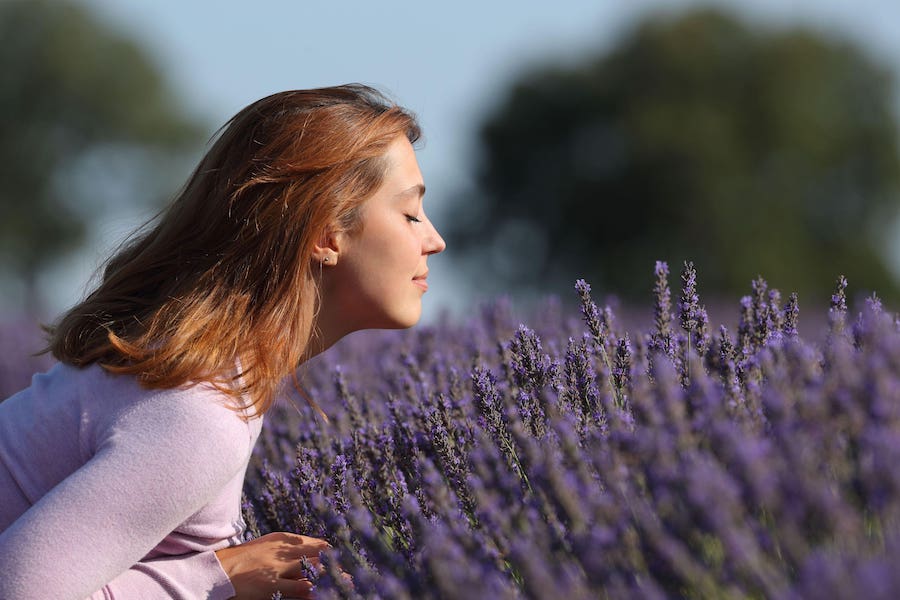The best scented plants to enhance your balmy summer evenings
Plant fragrant shrubs, perennials and annuals near your garden seating area
Now that many of us have given our barbecues an airing and are enjoying the longer evenings, it’s wonderful to take in the variety of scents which pervade in the garden when the sun goes down.
Special offer: Get 12 free Lavender plants, just pay p&p
Many plants actually increase their perfume production at night to attract moths to pollinate them.
Choose your plants carefully, and you can have a wonderfully scented garden for much of the summer.
View this post on Instagram
There are many shrubs – mock orange (Philadelphus), shrub roses and lavender – which are all easy to obtain, along with fragrant annuals, which make great additions to patio pots and raised beds.
Even if you only grow some traditional sweet peas to cut and place in a vase on your outside table, guests will be able to enjoy a whiff of their heady scent.
Here are some of the best fragrant plants for enjoying as the sun sets…
1. Night-scented stocks (Matthiola)

These pretty, old-fashioned annuals reach their fragrant peak at twilight, where they become moth magnets. Reaching up to 60cm in height, they produce small, four-petalled flowers in shades of white, lilac or pink and are ideal at the front of an informal scheme or added to container displays. They like full sun in a sheltered position and moist, well-drained soil.
2. Evening primrose (Oenothera)

If you’re a wildflower fan, these fragrant bowl-shaped yellow flowering beauties are excellent for pollinators, and also produce their optimum scent in the evening.
Depending on the variety you choose, they can grow to up to 1m, ideal for the middle of a border, or to just 30cm, better for a container. Grow them in full sun or semi-shade. They don’t require much attention apart from watering during prolonged dry periods, and should flower from June to September
3. Mock orange (Philadelphus)

This is among the most fragrant of flowering shrubs, ideally given plenty of space to spread out, where its white blooms can emit their delicious scent reminiscent of orange blossom – which will pervade the whole garden on balmy summer evenings.
Single-flowered varieties are great for bees and butterflies and you can also get types which are suitable for large containers, such as ‘Manteau d’Hermine’, ideally placed near a window or door on the patio. They are easy to grow, withstanding poor soil and wind, but generally not shade.
4. Nicotiana (tobacco plant)

Hanging their flowers sleepily during the day, especially in really bright sunlight, the old-fashioned varieties of these annuals come to life in the evening when their blooms open to emit a sweet scent – so make sure you place them in containers near where you are sitting.
Some, such as Nicotiana langsdorffii, will grow to 1.5m so may be better in the border or secured to a garden trellis, while others, such as the beautiful ‘Lime Green’, grow to around 60cm and are ideal for a pot. If you want flowers which open up during the day, go for the newer strains, but the old-fashioned ones will give you more perfume.
5. Lilies

These are guaranteed to give you fragrance from mid-summer onwards, whether you want a dazzling splash of colour on your patio with showstopping varieties like the pink oriental ‘Stargazer’, which likes full sun and will need staking. Or more subtle hues which pack a fragrant punch, such as Lilium longiflorum, with its long, white, trumper-shaped flowers.
This one is best grown in large pots (it grows to 1m) as it is not totally hardy. Or try Lilium regale, a trumpet lily growing to 1m, which lights up a summer border.
Where to place them
Perfume is most apparent in calm conditions, as wind will carry the scent away in the air, so it’s best to plant fragrant climbers in a sheltered spot or on a partially enclosed patio.
Consider combinations

Pineapple sage
If you want fragrant perennials in your borders, go for combinations of those with scented flowers and those with fragrant foliage to complement each other.
Some scented plants are not spectacular but will bring out the best in a border when planted with colourful non-perfumed plants. Try growing lemon-scented verbena and pineapple sage (Salvia elegans, whose foliage releases a pineapple-like scent when you brush past it) in the border amid unscented blooms, and you will have the best of both worlds.
Locate leafy scents
View this post on Instagram
Plants with scented foliage include scented leaved pelargoniums, Achillea filipendulina, catmint (nepeta), Monarda didyma and the lemon balm Melissa officinalis `All Gold’, while those with perfumed flowers include Iris unguicularis, Phlox paniculata, Hosta `Honeybells’ and many varieties of dianthus.
Of course, plants with heavier scents may dominate, so keep richly fragrant roses, lilies, lavender and other strongly aromatic plants separate from those with more subtle perfumes.
The Press Association
Latest posts by The Press Association (see all)
- Actor Richard Chamberlain dies aged 90 - March 30, 2025
- 5 new books to read this week - March 26, 2025
- 6 things a physio wishes people over 60 would stop doing - March 25, 2025
- NHS reminder to 7.5m people as Covid-19 jab booking system opens - March 25, 2025
- The truth about cholesterol – what you need to know - March 25, 2025




















